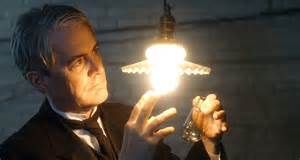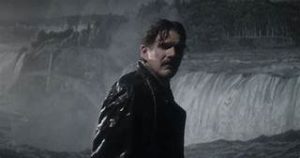Quiet in tone, and visually arresting, TESLA tells the story of a man whose perspective had only the most tangential relationship to that of the mere mortals who surrounded him. Michael Almereyda film echoes that with a high-minded tone-poem that mixes fact and fiction to achieve an emotional and intellectual, if not factual, truth. The result creates a Tesla-esque resonance world and image that presents its eponymous subject on its own, sometimes contrary, always piquant, terms.

Eve Hewson
It begins with an image one would not normally associate with the scientist: roller skating through the marble halls in the extravagant home of J.P. Morgan, one of the Gilded Age’s richest men. But it’s not J.P. with whom Tesla is gliding, but rather his youngest daughter, the independent and intellectual Anne (Eve Hewson), who has taken a fancy to the eccentric genius. As an introduction to an iconoclastic bio-pic, it is superb. As are the flights of fancy in the “what-if“scenes with which the film is punctuation, and which are quickly identified as such. When Anne, who narrates the film, is later seen at a laptop offering statistics about Google searches of the protagonists, it fits right in.

Kyle MacLachlan
This is film as opulent as the Gilded Age itself, but carefully edited to be not just a feast for the eyes, but also a sharply observed study of its characters and their milieu. Thomas Edison (played with flinty ambition by Kyle MacLachlan), Tesla’s first employer after the Serbian emigrated from Croatia in 1884, introduces himself to us with a story of how he failed to notice a childhood companion was drowning. George Westinghouse (James Gaffigan), who came to Tesla’s rescue when the genius was again in financial distress, is the soul of ego-less compassion and ingenuity, with a streak of self-interest to which he, himself, may be mostly blind. Morgan (an equanimous Donnie Keshawarz), a brilliant man of business who financed Tesla’s most ambitious, and expensive, projects, is no cipher to anyone. When Tesla waxes grandiloquent about the poetry of his science, and the egalitarian nature of his plans for lighting the world, the man of business instantly, and only, sees the money-making applications.
Almereyda takes the punctuated equilibrium approach to the chronology of Tesla’s life, zeroing in on the most important points, while filling in the rest with a dash of well-modulated expository dialogue, or nothing at all. There is the raging public dispute between Edison and Westinghouse about which is the better electric current, AC or DC (think PC or Mac, to put in contemporary terms) that reached is apogee (or is it perigee?) with the first execution by electrocution; the magic of Tesla’s use of magnetic fields to generate energy without sparks; the sojourn in Colorado that shorted out the city; the absolute genius of his ideas, and his absolute failure as a businessman. The short-sightedness of those around Tesla is infuriating as they question his professional credentials, though when his prototype is a can of shoe-polish, the context makes it understandable. Of course, there is a short interlude of his particular rituals around eating. It would be a cheat not to include it, along with his aversion to pearls. Over it all, the specter of death with Edison’s story, the endless death scenes improvised by the cynically seductive Sarah Bernhardt (Rebecca Dayan), provides a metaphysical subtext to wonders of science, and a springboard to further musings on the difference between the permanent and the ephemeral, and, by extension, reality itself.

Ethan Hawke
TESLA embraces the artificiality of cinema with gusto, using them to highlight the artificial nature of telling a life story, and a complex one, in the time allotted by a feature film. Rear-screen projections provide an artist’s canvas on which the story is brought to life, and the characters discuss the failings of capitalism and the oscillations of the earth as naturally as others ponder the weather. For all its beauty, it is Hawke’s performance that anchor it. It is a performance that is driven by an inner life so rich that reality holds no attraction aside from giving substance to the inventions crowding Tesla’s head demanding to be built. And concepts so original that words, as Tesla struggles to find them, are hopelessly inadequate. In Hawke’s eyes, we can see the perfection that are beyond the verbal.
This thoughtful, potent film may be understated in form, but is explosive in its consideration of the struggle of true genius in a world where originality is suspect, and imagination must be channeled into the mundane to be appreciated
[…] Thomas Edison (played with flinty ambition by Kyle MacLachlan), Tesla's first employer after the Serbian emigrated from Croatia in 1884, introduces … View full source […]